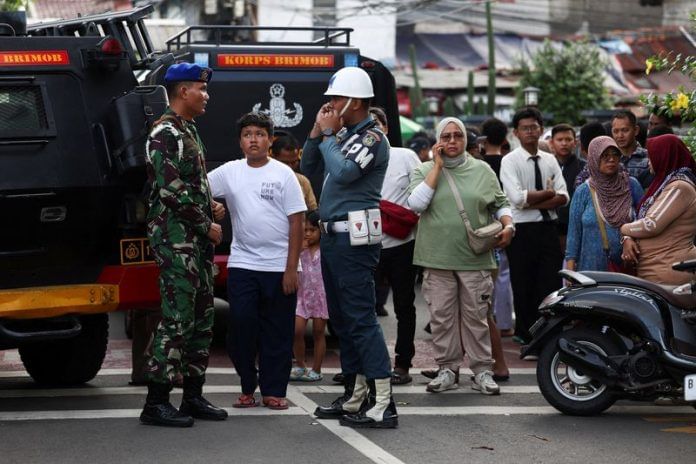By Ananda Teresia
JAKARTA (Reuters) -An Indonesian student suspected of carrying out a bomb attack at his school mosque in Jakarta wrote of feeling isolated in his 42-page diary and drew inspiration from a Telegram group glorifying white supremacist attacks, according to new details from police.
The early‑November explosions struck worshippers as they lined up for Friday prayers, injuring 96 people and scattering shoes, prayer mats and glass across the courtyard.
Investigators have since combed through his internet history and raided his home to piece together how a reclusive 17-year-old in Muslim-majority Indonesia absorbed extremist ideologies with no historic influence in the country.
“He wanted to be recognised by members of the online community … because he feels lonely,” Jakarta police spokesperson Reonald Simanjuntak told Reuters.
Police said the student, who is being treated as a “child facing the law” under Indonesia’s juvenile crime regulations and has not been formally identified, acted alone, building seven small bombs at home by following instructions from YouTube videos.
He sourced materials such as potassium chloride and nails from online marketplaces without setting off alarm bells, a security lapse police said they will examine closely.
Four of the devices detonated while three failed to explode.
Simanjuntak said the teenager joined an international Telegram channel where members shared violent material and discussed past attacks, including the 2019 massacre at mosques in Christchurch, New Zealand, and the 1999 shootings at Columbine High School in the United States.
Telegram’s terms of service explicitly forbid the promotion of violence, spokesperson Remi Vaughn told Reuters, saying moderators using AI tools to monitor public areas of the platform and remove millions of pieces of harmful content each day, including material that promotes violence.
The press office of Google, which owns YouTube, did not immediately respond to request for comment.
“DIARY REB”
During a raid on his home in a densely populated Jakarta neighbourhood, police found a notebook titled “Diary Reb” – which they believe refers to a personal ‘diary of struggle’ – written mostly in English, Simanjuntak said.
The diary contained sketches of the mosque and school layout marking where the bombs would be planted, as well as the handwritten date “November 7”, which police say corresponds to the day of the attack. Choosing Friday prayers at the school mosque, Simanjuntak said, was intended to maximise the number of potential victims.
In the diary, he mentions his past trauma and writes about wanting to end his life while also harming others, police said.
Relatives told Reuters the boy came from a low‑income family. His father works as a cook for a catering company. They lived in a two‑storey house in a middle‑class area of North Jakarta, owned by the company’s proprietor and shared by several people.
His relative, Rundiati, 53, who lived with him said the boy spent most of his time in his room and came out only to eat.
“He was always on his laptop in his room,” she said, adding he had grown more withdrawn after his parents divorced and his mother remarried.
“There was no place for him to express himself, his emotions to his family or to his friends,” Simanjuntak said.
To conceal his plans, police said he told his father the materials he bought online, including toy guns, were for cosplay.
LEGAL PROBLEMS
Police plan to question the suspect soon. He is in stable condition in hospital, recovering from injuries sustained when an apparent suicide device intended to kill him failed to detonate properly.
Before formally charging him, the country’s parole and probation office will determine whether the teenager is eligible to stand trial and what form any legal proceedings should take, Simanjuntak said.
The office will also decide whether he should be handed over to the state or returned to his parents, he added, without providing a timeline.
Indonesia, the world’s fourth most populous country, has sought to limit access to social media for younger users. The country has a fast‑growing youth population and about two‑thirds of social media users belong to Generation Z.
Separately on Tuesday, Indonesian police arrested five suspects who allegedly recruited 110 children between the ages of 10 and 18 to be part of “terrorism networks”.
At a briefing on those arrests, officials said the suspected bomber’s case, though not linked to a particular organisation, similarly underscored the risks of radicalising young people through social media.
(Reporting by Ananda Teresia, additional reporting by Stanley Widianto; editing by Gibran Peshimam and Saad Sayeed)
Disclaimer: This report is auto generated from the Reuters news service. ThePrint holds no responsibility for its content.






